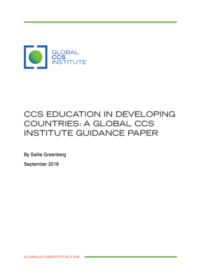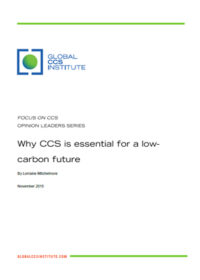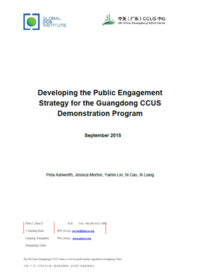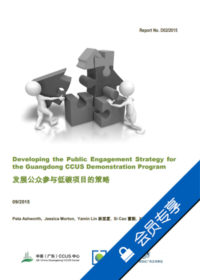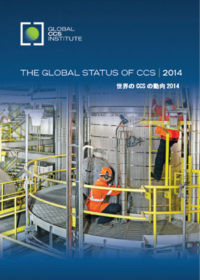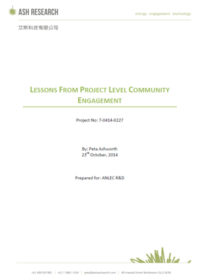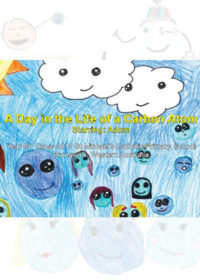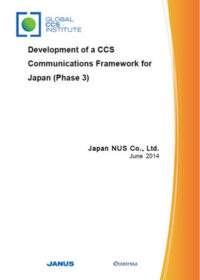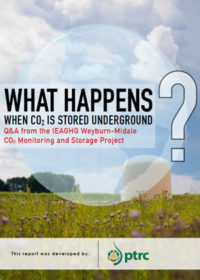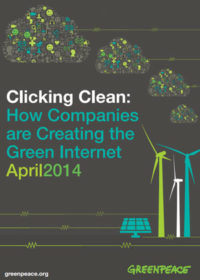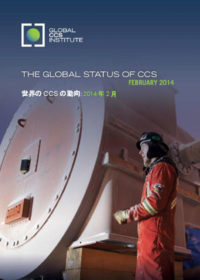Resources
Publications
Our publications, reports and research library hosts over 500 specialist reports and research papers on all topics associated with CCS.
View our Publication Library Disclaimer.
Filter by
CCS education in developing countries – A Global CCS Institute guidance paper
11th October 2016
Topic(s): Public engagement
Education has long been recognised as a critical component in understanding how science, society, and adaptation influence thinking about issues impacting our climate. As an emerging technology with an important role to play in shaping our low carbon energy future, carbon capture and storage (CCS) plays a role in our teaching around these topics in both developed and developing countries.
Yet, past research from Dowd and Jeanneret and Corry and Reiner identified that CCS is poorly represented in school science curriculums, and teachers report a lack of confidence in teaching about the technology. To help address these and other issues around public engagement with CCS, the Institute works with educators and communication/engagement staff around the world to showcase and share best practice, and support the adaptation of the Institute’s own CO2degrees Education program.
This short guidance paper is a welcome contribution to the Institute’s education resources. In it, Geochemist and renowned CCS education professional Sallie Greenberg, PhD explores the key lessons from past CCS initiatives and the general education literature, before highlighting areas of commonality and potential areas of challenge when delivering education initiatives in developing countries. The Paper then uses a comprehensive case study on the work of the Stakeholder Engagement Team at the South African Centre for CCS (SACCCS) in order to bring some of these examples and learnings to life.
Disclaimer
The content within the Global CCS Institute Publications, Reports and Research Library is provided for information purposes only. We make every effort and take reasonable care to keep the content of this section up-to-date and error-free. However, we make no claim as to its accuracy, currency or reliability.
Content and material featured within this section of our website includes reports and research published by third parties. The content and material may include opinions and recommendations of third parties that do not reflect those held by the Global CCS Institute.
Why CCS is essential for a low-carbon future
10th November 2015
Topic(s): Carbon capture use and storage (CCUS), Engineering and project delivery, Health safety and environment, Public engagement
Lorraine Mitchelmore's article, Why CCS is Essential for a Low-Carbon Future, is part of an opinion leader’s article series for Focus on CCS. The series features contributions from world leading authorities on carbon capture and storage (CCS), presenting their perspectives on the role for the technology in reducing our carbon dioxide emissions. The series is published by the Global CCS Institute to contribute to the conversation about CCS within the portfolio of options to help tackle climate change.
Lorraine Mitchelmore is President and Canada Country Chair of Shell Canada Limited, Executive Vice President Heavy Oil for Upstream Americas.
Disclaimer
The content within the Global CCS Institute Publications, Reports and Research Library is provided for information purposes only. We make every effort and take reasonable care to keep the content of this section up-to-date and error-free. However, we make no claim as to its accuracy, currency or reliability.
Content and material featured within this section of our website includes reports and research published by third parties. The content and material may include opinions and recommendations of third parties that do not reflect those held by the Global CCS Institute.
Developing the public engagement strategy for the Guangdong CCUS Demonstration Program
29th October 2015
Topic(s): Carbon capture use and storage (CCUS), Public engagement
The Global CCS Institute and the UK-China (Guangdong) CCUS Centre have authored this report to document the process that has been undertaken by the China Resources Power (Haifeng) and China National Offshore Oil Corporation (CNOOC) Integrated Carbon Capture and Sequestration Demonstration Project (CRP Power Project) to develop a public engagement strategy for the project.
This undertaking is the first of its kind in China and is an ongoing journey.To date, the majority of CCS public engagement project case studies have analysed activity that has taken place in Europe, North America and Australia. An important next step is to reflect on how current best practice may apply in other regional contexts. The experiences and lessons learned by the CRP Power Project may be useful to other CCS project proponents in China who are considering the development of a public engagement strategy.
This report is authored by Peta Ashworth (Ash Research), Jessica Morton (Global CCS Institute), Yamin Lin and Si Cao (Nafang Media) and Xi Liang (UK-China (Guangdong) CCUS Centre). The authors would like to acknowledge the strategic advice and input from Qianguo Lin (Global CCS Institute) and Dr David Reiner (Judge Business School, Cambridge University).
Jessica Morton, the Institute’s Public Engagement Advisor Asia-Pacific has written an Insight that provides an overview of this report and other recent CCS public engagement activities in the Asia Pacific region.
Disclaimer
The content within the Global CCS Institute Publications, Reports and Research Library is provided for information purposes only. We make every effort and take reasonable care to keep the content of this section up-to-date and error-free. However, we make no claim as to its accuracy, currency or reliability.
Content and material featured within this section of our website includes reports and research published by third parties. The content and material may include opinions and recommendations of third parties that do not reflect those held by the Global CCS Institute.
全球碳捕集与封存研究院和中英(广东)CCUS中心授权该报告介绍了由华润电力(海丰)和中国海洋石油总公司(中海油)一体化碳捕集与封存示范项目(CRP Power Project)实施的项目公众参与战略开发的过程。
此次行动在中国属于首例且是一个持续的过程。到目前为止,CCS公众参与项目案例研究的主要工作是,分析了欧洲、北美和澳大利亚既有的活动。下一步的重点就是仔细考虑目前的最佳实践如何在其他区域环境中得到应用。从CRP Power Project中所学到的经验教训可能对于中国其他考虑公众参与战略发展的CCS项目支持者们很有用。
该报告经由Peta Ashworth(Ash Research)、Jessica Morton(全球碳捕集与封存研究院)、林亚茗和曹斯(南方新闻)和梁希(中英(广东)CCUS中心)授权。授权者们希望感谢林千果(全球碳捕集与封存研究院)和David Reiner博士(剑桥大学贾吉商学院)对本报告的战略性建议和投入。
Jessica Morton,研究院亚太区公众参与高级顾问写了一份观点,对本报告进行了综述并介绍了亚太区近期其他的CCS公众参与活动。
Disclaimer
The content within the Global CCS Institute Publications, Reports and Research Library is provided for information purposes only. We make every effort and take reasonable care to keep the content of this section up-to-date and error-free. However, we make no claim as to its accuracy, currency or reliability.
Content and material featured within this section of our website includes reports and research published by third parties. The content and material may include opinions and recommendations of third parties that do not reflect those held by the Global CCS Institute.
我々は、気候変動の緩和に対する最小コストアプローチの一環として、いかにCCSを最適な形で展開できるかについて議論する時期に入っている。当インスティテュートは55件の大規CCSプロジェクトを確認しているが、これらプロジェクトの実現を後押しするための行動が今まさに求められている。
「世界のCCSの動向2014」では、これら開発計画段階にあるCCSプロジェクトの詳細について記載すると共に、プロジェクトの実現を後押しするための行動について検討・分析を行っている。また、将来のCCS展開に関して、CCS開発の対象となる産業と地域の幅を広げつつ次世代のプロジェクトを育てるための基盤作りに必要な活動について検討・分析を行っている。
Japanese translation of The Global Status of CCS: 2014
Disclaimer
The content within the Global CCS Institute Publications, Reports and Research Library is provided for information purposes only. We make every effort and take reasonable care to keep the content of this section up-to-date and error-free. However, we make no claim as to its accuracy, currency or reliability.
Content and material featured within this section of our website includes reports and research published by third parties. The content and material may include opinions and recommendations of third parties that do not reflect those held by the Global CCS Institute.
CCS in the Baltic Sea Region – Bastor 2. Work package 3: social aspects for Baltic Sea storage of carbon dioxide
13th April 2015
Topic(s): Carbon capture use and storage (CCUS), Public engagement
Carbon capture and storage (CCS) has been highlighted in many countries and regions as a vital measure needed to reduce our greenhouse gas emissions in the fight against climate change. The technical and commercial development has been impeded by projects and project plans facing opposition by different groups. Against this background, this report describes the results of a study, within the BASTOR2 project, analyzing which social factors are likely to influence the plans for a proposed Baltic Sea storage project.
As there are not yet any CO2 storage projects in the Baltic region, the analysis for this report has been carried out on three Swedish case-studies of other energy related projects in the Baltic Sea. The social research literature consistently points to local and regional contexts as having a large influence on the perceptions and acceptance of CCS projects. The report consequently highlights a number of contexts, or conditions, that are identified as important factors in how the case-studies have been perceived and accepted or opposed in the local and national context.
Disclaimer
The content within the Global CCS Institute Publications, Reports and Research Library is provided for information purposes only. We make every effort and take reasonable care to keep the content of this section up-to-date and error-free. However, we make no claim as to its accuracy, currency or reliability.
Content and material featured within this section of our website includes reports and research published by third parties. The content and material may include opinions and recommendations of third parties that do not reflect those held by the Global CCS Institute.
Lessons from project level community engagement
23rd October 2014
Topic(s): Carbon capture use and storage (CCUS), CO2 storage, Public engagement, Social research
The South West Hub Carbon Capture and Storage Project team, led by the Western Australian Department of Mines and Petroleum (DMP) is committed to an open process of community involvement during all stages of the project. The project team host regular community information sessions and make regular appearances at local agricultural shows. In October 2014 the project team released this report, ‘Lessons from Project Level Community Engagement’ that discusses the impacts and effects of the public engagement program undertaken by DMP.
This report is written by Peta Ashworth, Ash Research, for ANLEC R&D.
Disclaimer
The content within the Global CCS Institute Publications, Reports and Research Library is provided for information purposes only. We make every effort and take reasonable care to keep the content of this section up-to-date and error-free. However, we make no claim as to its accuracy, currency or reliability.
Content and material featured within this section of our website includes reports and research published by third parties. The content and material may include opinions and recommendations of third parties that do not reflect those held by the Global CCS Institute.
A day in the life of a carbon atom. Starring: Adom
28th July 2014
Topic(s): Carbon capture use and storage (CCUS), Education, Public engagement
The illustrated children’s book was created by year six and seven students and highlights the carbon capture and storage (CCS) process. The book was launched at the 2014 National CCS Conference in Sydney, Australia.
Disclaimer
The content within the Global CCS Institute Publications, Reports and Research Library is provided for information purposes only. We make every effort and take reasonable care to keep the content of this section up-to-date and error-free. However, we make no claim as to its accuracy, currency or reliability.
Content and material featured within this section of our website includes reports and research published by third parties. The content and material may include opinions and recommendations of third parties that do not reflect those held by the Global CCS Institute.
Development of a CCS communications framework for Japan (phase 3)
1st June 2014
Topic(s): Capacity development, Carbon capture use and storage (CCUS), Communication, Public engagement
The Japanese Knowledge Network (JKN) is a group of over 20 organisations sharing knowledge on topics critical to accelerating carbon capture and storage (CCS) in Japan. A key task of the has been to create a framework for communicating CCS to the general public.
This report presents the findings of the third phase of the 'Development of a CCS Communications Framework for Japan’ project. It is a detailed analysis of the tools and methodologies developed by the network to communicate CCS in an accurate and accessible way. The framework was tested with a group of Japanese citizens who critiqued the information and its delivery for relevance and effectiveness.
This report is authored by Japan NUS Co. Ltd. (JANUS), partnered by Quintessa Japan, and supported by Global CCS Institute.
Other Phase Reports
- Developing a CCS communications framework for Japan - Phase 1, August 2011
- A CCS communications framework developed by the Japanese Knowledge Network – Phase 2, October 2013
Disclaimer
The content within the Global CCS Institute Publications, Reports and Research Library is provided for information purposes only. We make every effort and take reasonable care to keep the content of this section up-to-date and error-free. However, we make no claim as to its accuracy, currency or reliability.
Content and material featured within this section of our website includes reports and research published by third parties. The content and material may include opinions and recommendations of third parties that do not reflect those held by the Global CCS Institute.
What happens when CO2 is stored underground? Q&A from the IEAGHG Weyburn-Midale CO2 Monitoring and Storage Project
16th April 2014
Topic(s): Carbon capture use and storage (CCUS), CO2 storage, Public engagement
This report presents common questions often raised by the general public about carbon capture and storage (CCS), giving answers based on the extensive data and results from the 12 years of research at the Weyburn-Midale oilfields. The intent is to offer fact-based answers about CO2 carbon storage.
Disclaimer
The content within the Global CCS Institute Publications, Reports and Research Library is provided for information purposes only. We make every effort and take reasonable care to keep the content of this section up-to-date and error-free. However, we make no claim as to its accuracy, currency or reliability.
Content and material featured within this section of our website includes reports and research published by third parties. The content and material may include opinions and recommendations of third parties that do not reflect those held by the Global CCS Institute.
Clicking clean: how companies are creating the green internet
1st April 2014
Topic(s): Energy efficiency, Public engagement, Renewables
The report is an update of Greenpeace’s How Clean is Your Cloud? from 2012. This update examines 19 global information technology companies that are leading the sector’s move to the cloud. These companies, while less well-known than branded giants like Google or Amazon, operate the data centers behind much of the Internet.
Disclaimer
The content within the Global CCS Institute Publications, Reports and Research Library is provided for information purposes only. We make every effort and take reasonable care to keep the content of this section up-to-date and error-free. However, we make no claim as to its accuracy, currency or reliability.
Content and material featured within this section of our website includes reports and research published by third parties. The content and material may include opinions and recommendations of third parties that do not reflect those held by the Global CCS Institute.
世界のCCSの動向:2014年2月
21st March 2014
Topic(s): CO2 capture, CO2 storage, CO2 transport, Public engagement
本報告書『世界のCCSの動向:2014年2月』は、世界の大規模統合CCSプロジェクトの状況をまとめるとともに、重要なプロジェクト、政策、法規制制度の整備などに関する国際動向を紹介するものである。2014年2月現在、世界で12件のプロジェクトが操業中、9件が建設中である。UAEで世界初の製鉄プロセスCCSが着工し、北米の2件の発電プロジェクトが年内に運開の見込みである。その他に29件が開発計画の様々な段階にあり、うち6件で2104年中に最終投資判断がなされる可能性がある。総プロジェクト数は、昨年10月刊行の『世界のCCSの動向:2013』での65件から60件に減少、うち4件が欧州であった。政策・制度面でも米・英などで大きな動きがあった。
Disclaimer
The content within the Global CCS Institute Publications, Reports and Research Library is provided for information purposes only. We make every effort and take reasonable care to keep the content of this section up-to-date and error-free. However, we make no claim as to its accuracy, currency or reliability.
Content and material featured within this section of our website includes reports and research published by third parties. The content and material may include opinions and recommendations of third parties that do not reflect those held by the Global CCS Institute.
